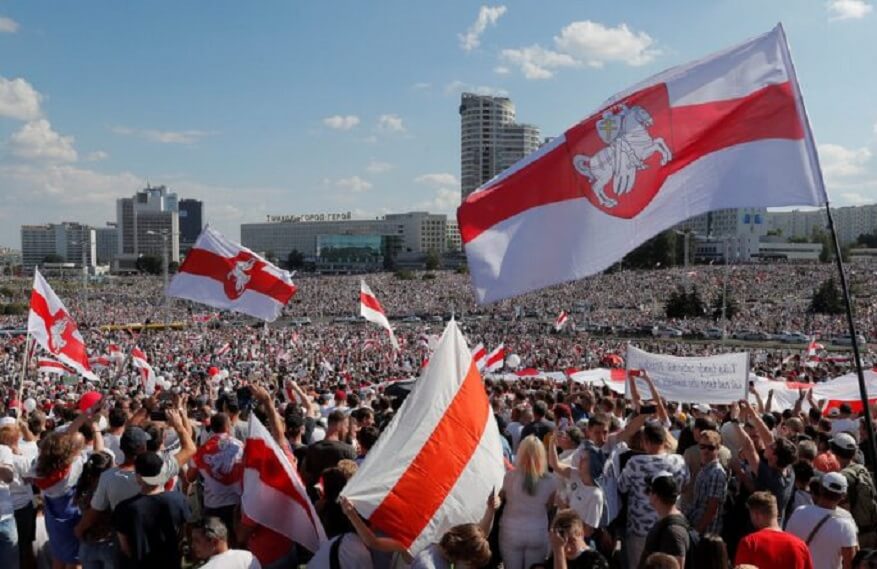Marco Levytsky, Editorial Writer.
Since the disputed August 9 election which handed Belarusian President Alyaksandr Lukashenka a sixth term, massive protests have erupted in the country and continue on a daily basis.
Authorities are cracking down on the protests with extreme brutality. Amnesty International and local human rights groups have collected horrifying testimonies from protesters in Belarus who describe being tortured or subjected to other ill-treatment in detention centres, including being stripped naked, beaten, and threatened with rape. Crowds outside a detention centre in Minsk say the screams of torture victims are audible from outside, and video footage corroborates this. The evidence points to a campaign of widespread torture and other ill-treatment by the Belarusian authorities who are intent on crushing peaceful protests by any means.
“For days the world has watched in horror as police in Belarus fire rubber bullets and tear gas, into crowds of peaceful protesters. It is now becoming increasingly clear that the bloody scenes on the streets of Belarus are just the tip of the iceberg,” said Marie Struthers, Amnesty International’s Director for Eastern Europe and Central Asia.
Many of the security forces beating and torturing protestors are not Belarusian at all, but Russian Spetsnatz personnel dressed up in Belarusian uniforms. Observers have noted that when they go shopping, they are unfamiliar with Belarusian currency.
Dictator Lukashenka claimed 80 per cent of the vote, but unofficial exit polls run by the opposition, showed challenger Svetlana Tikhanovskaya winning 80 per cent instead.
The election has been condemned as neither free nor fair by most Western democracies, while other dictatorships like the Russian Federation, the People’s Republic of China, North Korea, Turkey and the Central Asian states have congratulated Lukashenka on his victory.
According to RFE/RL, during an extraordinary meeting of EU foreign ministers in Brussels on August 14, they authorized the European Commission to draw up sanctions proposals against Belarus. U.S. Secretary of State Mike Pompeo said the United States would consider ending oil shipments as part of its possible sanctions and would work with its European partners in determining other actions.
Canada’s reaction has been tepid. Beyond declaring “Canada is deeply concerned by the actions of Belarusian authorities”, Foreign Affairs Minister François-Philippe Champagne avoided citing any concrete measures. “Canada remains committed to the people of Belarus. We will continue to closely follow developments and call for the results of Sunday’s election to reflect the will of the people,” he said.
But Ukrainian, Belarusian and other communities have asked Champagne to go much further. In an August 13 letter to the minister, Alexandra Chyczij, National President of the Ukrainian Canadian Congress; Alena Liavonchanka of the Belarusian Canadian Alliance; and Marcus Kolga of the Central and Eastern European Council in Canada, called upon the government to:
- Refuse to recognize the results of the August 9 election, as published by the Belarusian Central Election Commission;
- Unequivocally condemn the Lukashenka regime’s persecution and violence against demonstrators, opposition leaders and media;
- Together with our allies, implement Magnitsky sanctions against representatives of the Lukashenka regime responsible for targeting demonstrators, suppressing dissent and violating internationally recognized human rights;
- Together with our allies, support Belarusian civil society and Belarusian groups seeking freedom and democracy.
Other proposals which have been circulated at rallies across Canada include:
- To immediately cease all humanitarian, financial and technical assistance to Lukashenka and his structures, so as not to finance the repressive apparatus of Belarus and thereby encourage corruption;
- A ban on imports into Canada or the introduction of additional state duties for products of Belarusian enterprises (as well as their components) manufactured in violation of human rights, namely by the use of slave labour.
Members of the Belarusian community in Canada are very concerned about the safety of relatives still in Belarus. People we talked to asked us not to use their names for fear of reprisals against their family members. Communication is very difficult because the government controls the internet and is trying to shut down all communication except that disseminated by state authorities.
After a brief three years of democracy between 1991 and 1994, Belarus fell under the grip of Lukashenka in what was actually a free election. But it was the last time a free and fair election was held in that country. Lukashenka imposed a dictatorship, renewed the Russification policy of the USSR, replaced the symbolism of independent Belarus — including its red and white flag — with that of the Belarusian Soviet Socialist Republic, sought a union with Russia, imposed censorship and otherwise violated human rights. He has even been known to praise Adolph Hitler.
What Belarusians are striving for, as one participant in the Edmonton rally told New Pathway – Ukrainian News, is a democratic society, a return to Belarusian, not Soviet, symbolism, the adoption of Belarusian as the state language and movement towards the West and away from Russia. So prevalent has been the Russification of Belarus, that those who want Belarusian established as the state language can’t speak it themselves because they had no opportunity to learn it under the Soviets or under Lukashenka. In fact, participants at the Edmonton rally spoke in Russian because they could not speak Belarusian.
As a Ukrainian community, we must give active support to the Belarusian community in their struggle for democracy and human rights. Not only is this a moral issue, but also a geopolitical one. Should Belarus join Ukraine and the Baltic countries as a democratic bloc of former Soviet Republics, this “virus” could even spread to the Russian Federation. And should the Russians themselves rise up against Putin’s tyranny, the world would be a much safer place to live in.
Share on Social Media


































